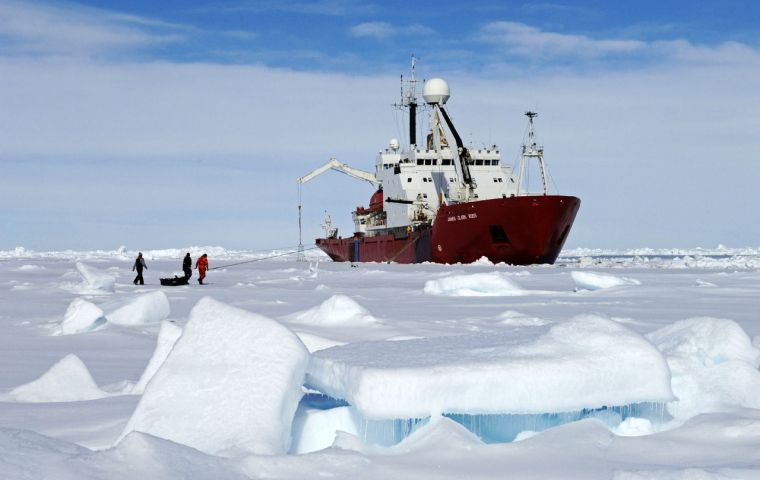MercoPress. South Atlantic News Agency
UK-US launch Antarctica research program to predict sea-level rise
 The mission will deploy teams of researchers, using a suite of technologies to investigate changes on the ice and in the ocean.
The mission will deploy teams of researchers, using a suite of technologies to investigate changes on the ice and in the ocean.  Scientists know already that Thwaites Glacier, which is twice the size of the UK, accounts for around 4% of global sea level rise.
Scientists know already that Thwaites Glacier, which is twice the size of the UK, accounts for around 4% of global sea level rise. A new UK-U.S. Antarctic research program to improve the prediction of future sea-level rise was launched on Monday at British Antarctic Survey (BAS), Cambridge. The £20 million 5-year research collaboration, funded jointly by the UK Natural Environment Research Council (NERC) and the U.S. National Science Foundation (NSF), brings together over 100 polar scientists from leading UK and U.S. research organizations.
The International Thwaites Glacier Collaboration (ITGC) is the largest Antarctic research project undertaken by the two nations since the 1940s. Their mission is to deploy teams of researchers, using a suite of technologies to investigate changes on the ice and in the ocean. Their goal is to investigate the implications of a major glacier collapse on future sea level rise.
Scientists know already that Thwaites Glacier, which is twice the size of the UK, accounts for around 4% of global sea level rise. This contribution has doubled since the 1990s. The big unknowns are whether the glacier is likely to collapse in response to environmental change; when this might happen; how big a collapse could be, and the potential impact on sea level rise. The two nations recognize the importance and urgency in tackling these questions.
Director of BAS, Professor Dame Jane Francis said, “Both the UK and U.S. have considerable expertise in the fields of glaciology and oceanography. We have spent decades working individually and collaboratively to understand Antarctica’s changing environment and the impact this will have on our planet. Recent advances in satellite technologies, combined with state-of-the art technologies such as hot-water drilling through ice shelves and robotic underwater vehicles equipped with sensors, put our countries in a strong position to combine our scientific, technical and operational expertise for the benefit of society. It’s a tremendously exciting time for science.”
The logistics of mounting a scientific campaign in one of the most remote places in Antarctica is a huge operational challenge. The nearest permanently occupied research station to the Thwaites Glacier is more than 1600km away. Both countries will co-ordinate their aircraft operations to transport glaciologists to their study sites on the ice, and deploy their ice-strengthened ships so that oceanographers and geophysicists can approach the glacier from the sea.
Professor David Vaughan is Director of Science at British Antarctic Survey and the lead scientific coordinator for the UK explained that whilst Antarctica seems far away, what is happening there is already affecting sea-levels around the world.”UK and U.S. scientists have a track record of working well together on the ice, and together we have a unique opportunity to change our understanding of Antarctica. We believe this program will generate the information we need to help protect coastal cities, ecosystems and vulnerable communities around the world.”




Top Comments
Disclaimer & comment rules-

Read all commentsThe question is why is this piece appearing in Mercopenguin, a British government propaganda organ supposedly devoted to America, South America and the “South Atlantic”?
May 07th, 2018 - 12:19 am 0Commenting for this story is now closed.
If you have a Facebook account, become a fan and comment on our Facebook Page!